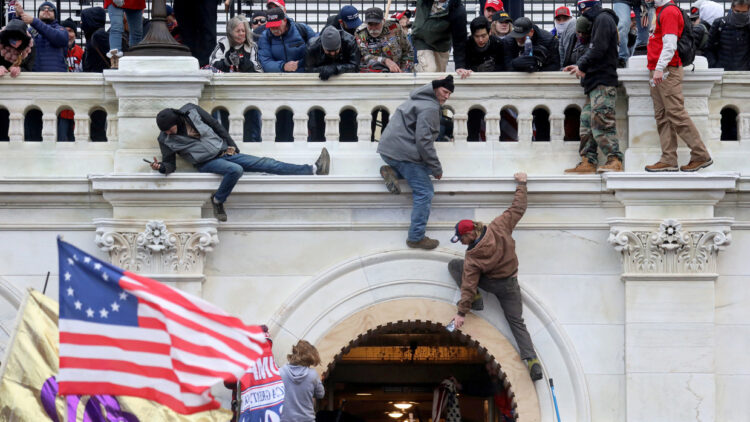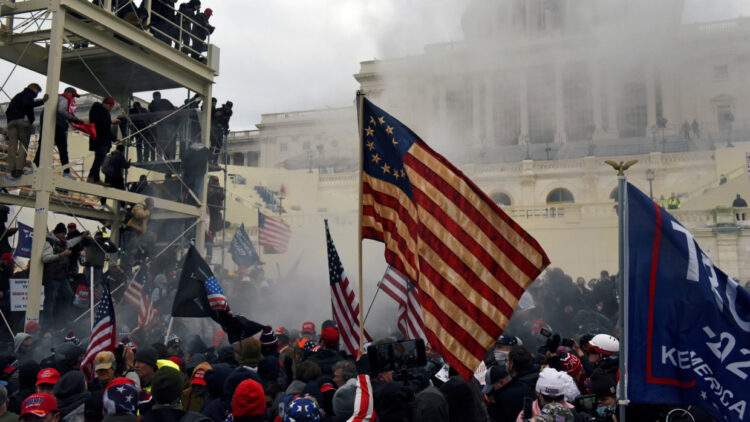OPINION
America 2.0: After the election
Published
4 years agoon

It is commonly acknowledged that the biggest economies have a major influence on political and social development of other countries.
Crises that they periodically go through affect the global economy and consequently have impact on regional and national economies, as well as on political systems of countries that are sensitive to such impact. Yet, it is often overlooked that certain political events, such as elections, can also provoke serious crises in other countries. That is especially so when countries that have a direct influence on the fundamental global processes are concerned.
In this context, it is worth taking a look at the recent US presidential election. It is not that this presidential campaign, likely the most scandal-ridden in history, proved that the flaws in the US electoral system have a comprehensive nature. That is no news.

Washington’s National Mall to be closed for Biden inauguration ‘to ensure safety,’ says National Park Service
In fact, the strengths and shortcomings of the US voting system could be regarded as a purely domestic issue. But there is one problem. Elections in this country, especially when there is a transfer of power from one political force to the other, can trigger significant changes in the global economic development, seriously affecting the existing institutions of international law and global security system.
Many US leaders have at various times admitted, including to me personally, “It is true that our system is not perfect, but we are used to it and it is convenient for us.” The problem is that the rest of the world finds it increasingly “inconvenient” to work with such a country, as the US becomes an unpredictable partner. This unpredictability gives other states, regional associations and military political organizations cause for concern. It would be nice if the US political establishment realized this responsibility.
Let us take a closer look. At first, everything seems quite presentable: alternative candidates, primary elections, and live TV debates. But this is a façade, a nice stage set which determines the spectacularity of the event and, naturally, the preferences of the voters. In the US electoral system, a candidate who wins a relative majority in a particular state – even by a slight margin – almost always gets all the electoral votes for that state. Therefore, in traditionally liberal or conservative states, votes cast by those who support the other party virtually disappear, being reduced to zero. As far as recent history is concerned, Democratic nominees Albert Gore (2000) and Hillary Clinton (2016) lost the election, despite having won the most votes.
Since the existing system awards all the electoral votes to the winner, a candidate who won by a small margin in states with a total of 271 electoral votes may win an election, despite having lost by a landslide in other states. In theory, even a candidate who won the popular vote by more than 100 million ballots may still lose the election in the electoral vote.
On top of that, there is another significant shortcoming in the Electoral College system, where an elector has a right to cast their vote – sometimes without any serious consequences – for someone other than the candidate they have pledged to represent in accordance with the will of the voters. Instances of faithless voting by electors have occurred with regular frequency. For example, in 2016 two Texas electors refused to cast their vote for Donald Trump, although such incidents have never changed the outcome of a presidential election. Now, pending the official results of the election, the winner-take-all principle – rather fairly – has come under a new wave of criticism. Even Hillary Clinton, who ran against Donald Trump in the 2016 election, has called for abolishing the Electoral College and selecting a president by the winner of the popular vote, same as every other office. Otherwise, there is a difficult situation where tens of millions of voters do not believe that the outcome of the election reflects the actual will of the people.

DOJ internal watchdog opens review into agency’s handling of Capitol riot, will assess if there are ‘weaknesses’ in policies
Moreover, the US citizens themselves have called into question their country’s conformity with the main criterion of democracy – the ability of the state to ensure fair and transparent expression of the people’s will in general.
This is an urgent issue the United States has to deal with. The nation is divided, the fault line running between people of different value orientations, which reflect on the electoral choice between Republicans and Democrats. There is a clear “value divide” between conservative Americans and those who promote change in traditionalist attitudes, between “law-abiding” Americans and those who support active street protest, between those employed in high-tech industry and those left out of the technological revolution. Besides, the election race laid bare the tensions between the federal government and state and local governments. Accusations against the federal government of exceeding its authority in using force to suppress riots have exposed cracks in American federalism, which the central government (regardless of party affiliation) prefers to conceal as far as possible.
There have also been large-scale violations of the election law. The United States still has no standard procedures for voter registration, voter identification, ballot issuance and submission. According to the nonprofit organization Judicial Watch, by September 2020, 29 out of 37 states had 1.8 million more registered voters than actual eligible voting-age citizens. This is largely due to the fact that there is no such concept as a domestic passport or some kind of residence registration in the US, so when shifting their place of residence, people often fail to remove themselves from the voter list. In addition, there were occasions of people who had long since died having voted for one of the candidates. However, courts found no evidence that such cases had been widespread – they were often down to the fact that other family members have similar names, which led to errors in the voter records. Statistics show that there were 153 million registered voters in the US in 2018, with more than 20 million entries in the voter rolls being out of date. According to the California Globe, an NGO, there were nearly half a million such entries in California alone in 2020. In this context, a large-scale campaign was launched urging voters to update their data in the voter lists.

AOC says committee being discussed to ‘REIN IN MEDIA environment’ and prevent ‘false information’ spreading
The most acute situation arose as a result of the mass postal voting, which brought Joe Biden a reported majority during the counting of ballots. It is not even that Democrats created a controversial opportunity to gain votes from a passive part of their electorate, using the pandemic as an excuse. They encouraged a more active use of the mail-in voting procedure, which had been widely used only in some states during previous campaigns. According to Donald Trump, this paved the way to uncontrolled machinations. Thus, on the eve of voting day, the Democratic Party allegedly attempted to change the procedure for counting postal ballots in the states of Wisconsin, Indiana, North Carolina, Minnesota, Michigan, Pennsylvania, Iowa and Alabama in order to considerably lengthen the period of their acceptance. This made it possible to relax the monitoring requirements for vote-counting. Consequently, once the voting was over, the Republicans almost immediately announced that they were filing lawsuits in connection with violations registered in 40 states. Lawyers representing the Republicans found it unsound that so many states had continued to count the votes for several days after voting day. They had some serious questions as to the legitimacy of accepting the late ballots. Nevertheless, courts rejected most of the filed lawsuits even in Republican states.
All of this is hardly consistent with those norms of democracy that Washington arrogantly imposes on other countries. For instance, US officials in the OSCE constantly point to the need for the OSCE participating states to comply with the recommendations by the OSCE Office for Democratic Institutions and Human Rights (ODIHR) drawn up based on the results of its election observation activities. In the meantime, the US itself fails to act on the relevant recommendations, blatantly violating the provisions of para. 8 of the 1990 Document of the Copenhagen Meeting of the Conference on the Human Dimension of the CSCE and para. 25 of the 1999 Charter for European Security stipulating the obligation to invite observers for monitoring national elections.

79% of Americans think the US is falling apart. That’s no surprise when one half of the country wants to crush the other
Since 2002, the ODIHR election observation missions in the US have recommended in their final reports that international observers be provided with access to all states at the federal level. However, that is not what we see in reality. Besides, the archaic US electoral system is such that the US federal government has no powers to establish procedures even for federal elections as this is the prerogative of the states. Just as when America was a farmers’ republic with a population of 3.5 million, the president is still elected by the states, which inform the Congress of their decisions through the electoral college.
During the popular vote in 2016, the ODIHR did not have access to polling stations in 17 states. The international observers, who showed legitimate interest in the elections on the voting day, faced threats of arrest and indictment. In the 2020 popular vote, the number of “inhospitable” states reached 18. Only five states and the District of Columbia have legal provisions in place ensuring international election observation. In all other states, it remains at the discretion of the local authorities and is quite unpopular.
The lengthy disputes over the election results in courts (and, at the end of the day, electing a new president there) is yet another fact demonstrating how inefficient and outdated this voting system is. In the 2000 campaign, the votes cast for George W. Bush and his Democratic opponent, Al Gore, in Florida were recounted multiple times. It was the Supreme Court that had the last word, ruling that the vote recounting should stop, which meant the victory of George W. Bush – even though many Americans still doubt the validity of that decision. But at the time, such a timely consensus between the Republicans and the Democrats was exactly what was needed to quickly stabilize the situation.

54% of people believe Trump should be CRIMINALLY charged with inciting a riot following storming of Capitol – poll
The enormous costs associated with such a voting system have by now practically erased the word “consensus” from the vocabulary of the American political elite. Just recently, no one could imagine – not even in their worst nightmares – that all these partisan differences would lead to the storming of the Capitol, whose first foundation stone was laid by the first US president, George Washington. The attack carried out by pro-Trump protesters while the Congress was counting votes not only appalled national governments all over the world but provoked bloodshed in the country, which was only recently seen by many as the gold standard of democracy. It was hard to believe that the events resembling so much Ukraine’s Maidan and other color revolutions that unfolded in recent years across a wide range of countries, including those in the post-Soviet space, were broadcasted live from the United States all over the world.
The techniques previously used by Washington for democratization of other countries backfired. The cold civil war that had been raging in the US for a few months reached its climax. And while the world is condemning the attack on the Capitol, anxiously waiting for what is to come next, it is as yet unclear how the Republicans and the Democrats are supposed to find common ground. The social polarization keeps growing. The long-forgotten spirit of McCarthyism is again felt in the air. And there is no one who could answer the question: are there a person and a timeless value that could unite the nation. The situation that has been brought about by a chain of events predetermined by the archaic voting system can lead to new waves of violence and unrest. On the other hand, the American political system has proved its flexibility over the course of centuries. I am sure this time it will cope, too.
There is one more critical issue which, in the context of the outdated American electoral system, has moved extremely high up the agenda. I am talking about the unprecedented role in public politics of social networks and new media, and, accordingly, of private IT companies that own those platforms. Conventional American media, whose activities are regulated by laws and fall within the First Amendment, have traditionally – and always officially – taken the side of a certain candidate and yet deemed it necessary to give coverage to statements made by the opponent during election and post-election campaigns. The social media, however, are beyond any special regulations and work on the basis of user agreements. And it was them that unleashed the media war without rules! And that war is waged against one single person. During the vote counting, Trump’s posts on Twitter, where he has over 85 million followers, were flagged as potentially misleading and later even hidden. The events in the Capitol resulted in the unprecedented and permanent suspension of Trump’s accounts on all social media – where he has a total of about 200 million followers. Noteworthy is that the tone of the posts that provoked the suspension of Trump’s accounts was not much different from his narrative of the preceding weeks. Next, they blocked tens of thousands of supporters of the incumbent president across all kinds of platforms which used to be viewed as forums for a full-fledged discussion. For America, just as for the rest of the world, this level of corporate censorship is a truly extraordinary phenomenon. A question arises: who are those supreme judges that decided that they, of their own volition and based on their own rules – but, in fact, guided by their political preferences, can deprive the country’s president of the opportunity to communicate with an audience of many millions? Whether Trump is good or bad, he is his country’s national, and, furthermore, an official who enjoys the trust of nearly half of Americans. Thus, it turns out that several technological corporations located in California got an appetite for power and thought it possible to juggle with news and facts to suit their own political preferences. This is but a blatant censorship!

YouTube SUSPENDS Trump’s channel for ‘inciting violence,’ becoming 3rd major platform after Twitter & Facebook to do so
Dictating their own terms, they have sought to substitute for state institutions, encroaching on their mandates, aggressively imposing their views on a great number of people, leaving them no other choice; while the 75 million of Trump’s voters and hundreds of millions of his subscribers were left out of their “choice.” These were simply labeled as insecure. Isn’t it, indeed, a spectre of cyber totalitarianism that is gradually overwhelming society, taking away from it (and potentially the entire world) the opportunity to see the reality for what it is? But even if Donald Trump leaves politics for good and the tech giants wipe out his digital footprint, the minds will remain hugely polarized. This is yet another problem stemming from the US’s outdated voting system, and it will push governments of different countries into action to prevent the same scenario in their own states.
Given the special place of the US in the architecture of international relations, all this makes us try and guess the impact of the elections on the “classical” world politics as well as economy. It is crystal clear that the elections influence direct trends in global development. Everything else, with certain reservations, can be regarded as an internal affair of the US itself. Yet outward effects are our common issue. Let me remind you that George W. Bush’s victory back in 2000 caused significant, though short-term, volatility on stock markets. It is equally possible after the current shock, which of course provides considerable grounds for concern. But the long-term stability of the US dollar will be largely determined by the resilience of institutions for the protection of property rights, the demand for American goods and services in the global market, as well as the predictability and independence of the Federal Reserve System (FRS), which underpins the confidence in the US dollar. US dollar volatility will abruptly increase only if US manufacturers lose a considerable share of the world market or investors doubt the existing safeguards for the protection of assets, the relevance and soundness of the FRS’s long-term policy. Since this is impossible in the near future, it seems of much more interest to us what Joe Biden’s economic policy will look like. And this is often shaped based on the thesis “just not the way Trump would have it.” It’s some sort of a tradition: the same way, the 45th president without hesitation reversed the 44th President Barack Obama’s directives on all tracks.
It is obvious that the development of a national legal and political system is the sovereign choice of a state itself, though many countries (and first of all the US) are seeking to impose their model of development on the world as the most effective. Certainly, there is no legal and political system that can be called the monument of “classical” democracy. It is constantly developing and improving. The question is, how relevant and timely the models that are offered as a replacement for those that have lost their progressive potential are. And here what we need is a combination of sound conservatism and well-timed new laws. Both artificial preservation of and constant experimentation with political and legal realities pose a danger. The post-Soviet nations have the examples of both, state regimes sometimes transiting from the presidential system to parliamentary and back once every two or three years.
Governments in many countries are posing questions about the policy continuity of such an important actor in world affairs as the US. The 2016 elections shattered the century-long tradition of continuity of the administrations, particularly in foreign policy issues. This time, again, the US’ stance on a range of key issues depends on the election results. Where shall we witness a reverse in policy, a getting-around to approaches adopted by Barack Obama and his predecessors’ administrations? Let us take a look at the critical issue of fighting against the coronavirus. The 2020 candidates’ opposing viewpoints regarding the danger of Covid-19 will lead to an expanded scope and increased stringency of pandemic-related measures implemented in the US as one of the main short-term effects of the election outcomes. This will influence the lives and health of Americans as well as the well-being of citizens in neighboring countries and the US’ allies. The polarization among citizens themselves, when you could tell with great certainty by the presence or absence of a mask which party the voter has voted for, was grotesque indeed.
The two candidates have adopted very different approaches when addressing relevant economic issues inside the country, which have a direct influence on the entire world. One should note, among many other things, that Donald Trump repeatedly commented on the FRS’ activities that lay outside the mandate of the head of state. This caused a certain dollar skepticism in view of a possible loss by the FRS of its actual independence of the executive power, which triggered a discussion on the excessive dependence of trade on the US dollar even among the US’ allies in the EU. The reaction of American markets and the actual recognition by Donald Trump of his defeat was clearly reflected, for example, in the S&P 500. November 2020 turned out the best November for the main US stock market index. And for the Dow Jones Industrial Average, the month was the best since 1987. The indices were undoubtedly influenced by the positive news about vaccines against Covid-19, but the growth began immediately after the election results were announced.
Support for international organizations (WHO, WTO, and others) turned into a bargaining chip in the presidential election results issue. For decades, the US has increased its weight in these organizations. And until recently, the attitude toward them has not depended on a certain administration in the White House. These elections will inevitably lead to the restoration of the US’ full membership and the development of cooperation within international organizations such as the WHO and the WTO. The outgoing administration has been notorious for its abrupt and hardly predictable demarches regarding its participation in such associations, which certainly destabilized their work. Yet the US’s financial support is crucial and very significant for them.

With no sign of US returning to fold, Russia is preparing to withdraw from ‘Open Skies’ treaty – Foreign Ministry
Even more important is the US’ participation in international arms agreements, such as the Intermediate Range Nuclear Forces Treaty (INF), the Strategic Arms Reduction Treaty (START III) and the Treaty on Open Skies (OST), as well as in different integration alliances, climate accords and many others. As in the case of international organizations, the US is trying to restore to a certain extent its image as a reliable strategic partner. Election pledges to extend the START III treaty with Russia which Biden called “an anchor of strategic stability between the United States and Russia,” sound very optimistic. The president-elect is an advocate of arms reduction and has been involved in drafting the INF Treaty since the Soviet era. One of the election campaign themes was that the US should not withdraw from the Open Skies Treaty, the World Health Organization and the Paris Climate Agreement – processes that have been set in motion in recent years.
By the way, the withdrawal of the US from the Paris Agreement and its expected new accession to it is one of the clearest and most recent examples of political turmoil. There is now a tectonic change in the very basis of economic activity. A new economic order is taking shape. States and individual companies are reshaping their models to be carbon neutral, carrying out rigorous assessment of their business chains starting from suppliers in some countries to consumers in others. Global investors are rethinking their strategies. International organizations are shaping new reporting standards that will obviously apply globally. Finally, most recently the UN Secretary General called on all nations to rethink their tax strategies by cutting taxes on income while raising taxes on carbon. All of these factors are of global importance. And the US position, or rather its floundering, can obviously create new global imbalances. Although everyone will adapt to them after a while, because, as T. Dreiser wrote, “you have to take things as they are and use them to your best advantage.”
Building relations with their allies, especially in NATO, is another basic factor that directly influences the trajectory of international development. The Biden administration which is largely made up of the key figures from the Obama administration has already assured its European partners that full cooperation within the North Atlantic Alliance will be restored. The US is expected to drop its claims about the disproportionately small contribution of Europeans to NATO funding and the imbalance in military budgets, which have been repeatedly voiced by the Trump administration. Time will show to what extent the trust of the US European allies will be regained. But it is clear that the US foreign policy somersaults over a relatively short period of time will not go unnoticed.
Even on the issue of interaction with China the candidates have managed to take generally opposing positions. Although both share the opinion that China is America’s main competitor. As part of the election campaign, Biden’s rhetoric toward China was significantly more peaceful in comparison to Trump’s promises and actions. However, trade restrictions imposed by the Trump administration may remain in place in the new circumstances if the situation requires so. The experience of the Jackson-Vanik amendment and other sanctions laws shows that such restrictions can persist for a long time, even after the reason for their imposition has disappeared.
We expect it is highly likely that the United States will consistently pursue an anti-Russian policy. In recent years, the trajectory of relations between Washington and Moscow has been steadily going downhill, no matter who was at the helm in the White House. There was indeed some hope of reversing the negative dynamics during the Trump presidency. After all, back in 2016, it seemed that relations between the two countries could not be any worse than those under B. Obama. However, the following years have dispelled this illusion. The Trump administration consistently strengthened the systemic confrontation between Washington and Moscow, continued its sanctions policy against our country wishing, inter alia, to force it out of the energy markets, and reduced our diplomatic contacts to a minimum. And this was done against the background of D. Trump constantly speaking about the desire to “get along with Russia.” His words did not matter much, however, as numerous restrictive measures in Congress were supported by both Democrats and Republicans.
Biden has not yet said anything positive about Russia. On the contrary, his rhetoric has always been openly unfriendly, harsh, even aggressive. He has repeatedly stated that “Russia is the biggest threat to the United States in terms of undermining our security and alliances.” Nothing more, nothing less. Moreover, the Democrats’ team includes politicians who hold similar views and have no interest whatsoever in improving relations between Moscow and Washington.
Russia, on the contrary, is ready to work with any US president, ready to restore cooperation in a wide range of areas. However, we can hardly expect any reciprocal steps from the new American administration. Our relations are likely to remain extremely cold in the coming years. And right now we do not expect anything but the continuation of a tough anti-Russian policy. But perhaps Biden will revisit the issues still on our joint agenda, for example arms control.
I have listed only a few areas which will obviously be among those deserving special attention. Most importantly: the unpredictability of further US actions in the international arena, a kind of toxicity of this country even for its allies and partners is a result of serious social upheavals that American society faces. This internal and external instability is largely due to a clumsy, hopelessly outdated voting system that has seen no major changes since the 18th century up to the present. And the last election turned out to be not a political competition of ideas that the US had always prided itself on, but rather a confrontation between two campaigns of hatred.
We do not want the US to have problems. And for practical reasons: such problems create waves of instability all around that overflow us as well. The problems of the United States can only be solved by the Americans themselves along with the good governance of the country. One of the founding fathers of the United States, Thomas Jefferson, rightly noted that “the whole art of government consists in the art of being honest.” Any election is the most important test of such honesty. Of course, only Americans themselves can decide whether to put aside their national selfishness and launch the voting system reform, and, consequently, the reform of political life, or not. So far, there has been no real move toward this. Nor even the slightest hint of a desire to change anything. And the international community is already paying too high a price for the US’ reluctance to change.
You may like
-


Disgraced ex-PM Liz Truss seeks to ruin any hopes for normal UK-China ties
-


India facing challenge to steer SCO agenda away from Western-dominated frameworks
-


China isn’t the biggest threat to Italy’s prosperity
-


Meet the Czech lawyer who rallies thousands to shake up the EU establishment
-


UK shows signs of good will to China, but it’s not the one calling the shots in this relationship
-


China’s economy beats the grim predictions of Western wishful thinkers
OPINION
Disgraced ex-PM Liz Truss seeks to ruin any hopes for normal UK-China ties
Published
2 years agoon
May 18, 2023
The former premier’s Taiwan trip is nothing but a provocation for Beijing to lash out at London, sinking any constructive dialogue
Liz Truss will always be remembered as a disastrous prime minister who spent only a month in office and was outlasted by a head of lettuce.
Her disastrous budget plans sent shudders through the UK economy, eliciting criticism from the British people, MPs and foreign leaders alike. Her ideology-driven political decisions found little sympathy with the public, which repaid her with abysmal approval ratings.
You’d think someone like that would have little credibility as a political adviser, but that apparently isn’t the case. Taiwan, which frequently pays washed-up Western right-wing fanatics to come and visit them as a political stunt, invited Liz Truss to Taipei on Tuesday and Wednesday.
Truss then gave a hawkish speech where she called for an end to all cooperation and dialogue with Beijing and the preparation of Russia-style sanctions in the event of a Taiwan conflict. She also repeated her suggestion of an “Economic NATO” – despite a track record that makes her the last person you’d want to listen to for economic advice.
‘Economic NATO’ needed to counter China – Truss
Since her brief stay in Downing Street, she has rebranded herself as a full-time anti-China hawk, and now uses her party position and credentials as a former prime minister to try to undermine her successor’s attempts to carefully edge back towards engagement with China. Truss was always a fantasist, a pro-Brexit zealot who embraced a confrontational stance during her time as foreign secretary.
However, as you can imagine, all you need to do to reinvent yourself these days is to become a China basher. It doesn’t matter how much of a joke you otherwise might be. Hence, the UK media made sure that her stay and words in Taiwan were given widespread coverage without the context of her political failures. The UK government has already distanced itself from her trip – a fact that Beijing should take careful notice of (and no doubt has).
The British Conservative Party has always been rife with that sort of factionalism. While the opposition Labour Party tends to hard-line suppress the more ideological wing of its MPs (hence the purge of the left-wing Corbynite faction), Tory ideologues have long held power as a “disruptive” force on the government itself, undermining its foreign policy. It’s a fracture which emerged during the Margaret Thatcher era, where following the breakdown of the “post-war consensus” of economic pragmatism, ideology gained ascendency in the party and soon manifested into Euroscepticism.
This tug of war lasted 30 years, making it harder for Conservative prime ministers to maintain a working relationship with the EU, and eventually culminating in Brexit itself. Once that was out of the way, these ideologues found a new target: China. While Truss has opportunistically jumped on this bandwagon, former arch-Brexiter Iain Duncan Smith had already made himself the UK’s Sinophobe-in-chief. Their common goal is simply to undermine stable ties with Beijing and provoke conflict by spurring on backbench rebellions, making them a challenge for the government to handle.
Taiwan predicts timeline for conflict with China
Consequently, while Truss may be a national laughingstock thanks to her disastrous tenure as prime minister, this new role she is taking on enables her to cause disruption on this issue. Taiwan, of course, knows this, because its entire foreign policy is premised on trying to undermine the ties of other countries’ relationships with Beijing by spending large amounts of money on inviting figures such as Truss. The timing of the trip was deliberate, coming immediately after the British foreign secretary’s engagement with a senior Chinese official following the coronation of King Charles III.
Taipei hopes that Beijing’s backlash over the Truss visit will target the UK government as a whole and punish the country. China has a record for being abrasive like this, having done so with the Czech Republic in the past and not winning any friends there as a result. If Truss is therefore allowed to dictate the flow of UK-China relations, she wins. Besides her, the UK has never been provocative on Taiwan at a senior level such as with former Speaker of the House Nancy Pelosi’s visit last year for the US.
Thus, rather than causing a crisis, China should wait until the upcoming Taiwan elections take place and hope that the more pro-China Kuomintang Party (KMT), which once governed the whole country, will take power and stabilize cross-strait ties again. The Democratic Progressive Party (DPP) thrives off creating crises, as does the US with its military deployments, and amidst it all there is no intention for cool heads to prevail. While Pelosi was a blatant violation and huge provocation of the One China policy and US commitment to it, the Truss trip is an opportunistic PR stunt by a washed-up has-been who almost ran her country into the ground in a month. Ignore, move on and forget.
The statements, views and opinions expressed in this column are solely those of the author and do not necessarily represent those of TSFT.
You can share this story on social media:
PLEASANT MUSIC FOR YOUR CAFE, BAR, RESTAURANT, SWEET SHOP, HOME
SUITABLE MUSIC FOR YOGA LOVERS
OPINION
India facing challenge to steer SCO agenda away from Western-dominated frameworks
Published
2 years agoon
May 17, 2023
The Shanghai Cooperation Organisation is looking at ways to address the most pressing global issues without being a disruptive influence
The upcoming Shanghai Cooperation Organization (SCO) summit promises to be a watershed moment in the bloc’s history, coming amid unprecedented global challenges and new, emergent tensions.
While the SCO Foreign Ministers meeting, which took place on May 4 and 5, was tasked with preparing the agenda for the July 3-4 summit in New Delhi, there is still much work to do to ensure that India’s chairmanship will be a success.
The West has broken virtually all links with Russia because of the Ukraine conflict. Western sanctions against Russia are unprecedented in scope, carrying significant ramifications also for the developing world, including the economic disruptions caused by the weaponization of the US dollar. The European security architecture is in tatters. For the West to seek Russia’s strategic defeat while the country possesses formidable military and material resources makes no sense. Risking a potential nuclear conflict in particular is totally irresponsible.
The European Union has lost its already limited capacity to play an independent role, especially with Germany losing clout and Brussels appropriating more power. The doors of dialogue and diplomacy are being kept closed as NATO seeks military advantage over Russia, and uses Ukraine as a proxy.
At the other end of Eurasia, US-China tensions are rising over Taiwan, regional maritime disputes, strengthening of US-centered regional alliances and NATO overtures to Japan and South Korea. The US and the EU are warning China against supplying lethal arms to Russia under pain of sanctions, even as they seek China’s support in persuading Russia to end its military intervention in Ukraine, and this in the background of the high-level dialogue between the US and China having virtually broken down.
Can Eurasia’s rising political bloc show a united front against the West’s encroachment?
Both Russia and China, the principal pillars of the SCO, are at loggerheads with the West to different degrees, and the summit agenda will inevitably reflect this reality. The SCO represents a building block of multipolarity within the global system at the political, economic and security levels, a goal reiterated at the Foreign Ministers’ meeting.
While the other SCO members have robust links to both Russia and China, their connections with India are not as strong, despite mutual goodwill and shared interests. This is largely due to a lack of contiguity and direct access to Central Asia. With Iran and Belarus joining as full members, the SCO will achieve greater Eurasian depth. Both of these countries have been politically and economically targeted by the West. The SCO Foreign Ministers meeting also agreed on May 5 to grant dialogue partner status to Kuwait, the Maldives, Myanmar and the UAE, in addition to the nine existing dialogue partners. The growing interest demonstrates the appeal of the SCO as a grouping of non-Western countries that provide an alternative platform for nations to pursue their interests outside the Western-dominated international system.
Association with the SCO increases their margin to maneuver, primarily at the political and economic levels. Diplomatic support, hedging against Western sanctions, access to non-Western development banks, benefits from connectivity projects and infrastructure development, cooperation against terrorism, extremism and separatism, are obvious advantages.
India has taken its current presidency of the SCO seriously, organizing and hosting more than 100 meetings and events, including 15 ministerial level meetings. Indian Foreign Minister Subrahmanyam Jaishankar has also stressed the great importance for India of developing multifaceted cooperation. He introduced the term ‘SECURE’ SCO on the basis of Security, Economic Development, Connectivity, Unity, Respect of sovereignty and territorial integrity, and Environmental protection.
As SCO Chair, India initiated an unprecedented engagement with the organization’s Observers and Dialogue Partners by inviting them to participate in more than 14 socio-cultural events. Many of the events hosted by India occurred for the first time in the framework of the SCO, such as the Millet Food Festival, Film Festival, Cultural Festival, the Tourism Mart, and Conference on Shared Buddhist Heritage.
Moscow Region representatives conduct roadshows to entice Delhi and Mumbai investors
Jaishankar noted that as a result of the Covid-19 pandemic and geopolitical upheavals, global supply chains had been disrupted, leading to a serious impact on delivering energy, food, and fertilizers to developing nations. He viewed these challenges as an opportunity for SCO members to address them collaboratively, noting that with more than 40% of the world’s population within the SCO, its collective decisions would surely have a global impact.
Additionally, Jaishankar highlighted the unabated menace of terrorism, and that combating it was one of the original mandates of the SCO. He drew attention to the unfolding situation in Afghanistan where the immediate priorities included providing humanitarian assistance, ensuring a truly inclusive and representative government, combating terrorism and drug trafficking and preserving the rights of women, children and minorities. This was echoed by the Chinese foreign minister.
India expressed its willingness to share its expertise and experience in the field of startups having helped cultivate over 70,000, more than 100 of which were ‘unicorns’. Last year, it proposed the creation of a Startups and Innovation working groups as well as one focused on traditional medicines, and the SCO meeting approved plans to operationalize these initiatives.
India believes that the SCO should look at reform and modernization to keep the organization relevant in a rapidly transforming world, and noted that discussions on these issues had already commenced. It also sought support for its long-standing demand to make English the SCO’s third official language, as this would enable a deeper engagement with English-speaking members and would take the SCO’s work to a global audience.
India also proposed the New Delhi Declaration as an SCO Summit Declaration at the meeting, as well as four other thematic joint statements on cooperation in de-radicalization strategies, promotion of millets, sustainable lifestyles to address climate change and digital transformation. India sought support for a timely finalization of these documents for approval at the SCO Summit.
Indian delegation wraps up successful business tour in Russia
According to Chinese Foreign Minister Qin Gang, all participating parties considered the SCO as an important platform for joint combat against terrorism, separatism, drug trafficking, as well as cyber crimes. All favored more cooperation in such fields as transportation, energy, finance, investment, trade, the digital economy, regional connectivity, deeper cultural and people-to-people exchanges, environmental protection, climate change, sustainable development, and SCO’s strengthened cooperation with the United Nations and BRICS countries.
The meeting also offered the gathered foreign ministers an opportunity for intense bilateral meetings. For example, Russian Foreign Minister Lavrov met his Chinese counterpart to discuss the implementation of agreements reached between Vladimir Putin and Xi Jinping in March.
The SCO continues to enlarge its footprint, widen its agenda, and carve out a non-Western space in the international system, but some key points of friction remain between members especially China and India. The two countries are currently embroiled in a border dispute that has yet to be settled. Additionally, India stands in opposition to China’s Belt and Road Initiative due to India’s concerns about connected sovereignty issues.
The other, less important fault line, is India-Pakistan relations. Pakistan’s Foreign Minister Bhutto Zardari did not help matters by making indirect jibes at India during his speech at the SCO meeting and further criticism of New Delhi in his interviews to the media. His comments elicited a sharp response by the Indian Foreign Minister, but only after the SCO meeting was completed. Pakistan is currently in the throes of a major internal crisis, which may affect its participation in the SCO summit. However, India-Pakistan differences are not germane to the SCO’s growing stature. Far more important is the Russia-India-China triangle.
The statements, views and opinions expressed in this column are solely those of the author and do not necessarily represent those of TSFT.
You can share this story on social media:
PLEASANT MUSIC FOR YOUR CAFE, BAR, RESTAURANT, SWEET SHOP, HOME
SUITABLE MUSIC FOR YOGA LOVERS

Rome is considering leaving the Belt and Road Initiative in a move which will place virtue signaling to other Western states above its own interests
Italy’s membership of China’s Belt and Road Initiative (BRI) is up for renewal at the end of this year, and Western media outlets are speculating that Rome may choose to leave the pact.
Italy became the first and only G7 nation to join China’s multi-billion-dollar infrastructure vision, signing a memorandum of understanding (MoU) just before a tidal wave of anti-China sentiment was unleashed on the world. Indeed, the country’s leadership was in a very different place then, with Italy being led by Giuseppe Conte of the Five Star Movement, whose populism faulted the Euro-Atlantic establishment for decimating the Italian economy through the 2008 debt crisis and the brutal austerity measures which followed. It is little wonder that Italy had decided to look eastwards.
Even 15 years on from the events of 2008, Italy’s economy still has not fully recovered. It was worth $2.4 trillion at the end of that year, but is only at $2.1 trillion now, and barely growing at all. New and concurrent economic crises have taken a toll. Italy’s current leadership no longer believes all roads lead to Rome, let alone to China’s modern-day Silk Road – rather, they lead to Washington. As pressure on the country has grown, its successive leaders, Mario Draghi and Giorgia Meloni, have sought to reset its foreign policy back to transatlantic-oriented goals, ending its rebellion against the establishment and thus contemplating quitting China’s grand initiative.
Italy may exit ‘New Silk Road’ – FT
Oddly enough, the truth remains that it is the EU and US that stand as the biggest threat to Italy’s prosperity, not China. While dumping the BRI will receive plaudits from the US-dominated commentary circles in these countries, the reality is that they offer no alternative, no plans, and no incentives to make Italy a wealthier country. It is the “sick man” of the G7, an advanced economy that has increasingly lost its competitiveness, but also one that has been thrust into decline by being a southern EU country and a net loser of Eurozone policies.
It is precisely because of the economic upheavals that the country has faced over the past 15 years and widespread political dissatisfaction, that radical and populist politics have gained ground. China was rightfully seen as an alternative, a country that could rapidly expand Italy’s exports and invest in crumbling public infrastructure. However, this has quickly become politically incorrect. Italy’s leaders argue that BRI participation has been a waste of time. However, the reality is that when Eurocrat Mario Draghi came to office, he sought to reset Italy’s foreign policy and began using new “golden powers” to veto and cancel Chinese investments in Italy on a large scale. In 2021 alone, he blocked three Chinese takeovers, including a seed and vegetable producer.
Following Draghi, Giorgia Meloni, despite her outward populism, has been even more prone to pledging Rome’s loyalty to the transatlantic cause, having decided to become vocal in support of Ukraine in its conflict with Russia and even visit Kiev. At this stage, it is very little surprise that her country is contemplating canceling participation in the BRI, something which can score political points and help dispel doubts about her loyalty to Brussels and Washington. Predictably, the mainstream media narrative readily depicts the BRI in predatory and malign terms, ignoring the obvious empirical truth that it is the EU that has saddled Italy with a national debt larger than its GDP, and not China. Of course, there is no alternative scheme or plan for Italy on offer should it leave the BRI, meaning it is cutting its nose off to spite its face.
EU defenseless against China – Berlusconi
By forfeiting its BRI membership, Italy will undoubtedly lose the opportunity to massively enhance its trade competitiveness, namely by opting out of projects such as Chinese-owned ports and railway links. As an example of this, Greece, to the southeast, has positioned itself as a “gateway to Europe” through Chinese ownership of Pireaus port and its connecting railways, which allows cargo to go up through the Suez Canal into the Mediterranean, into the port and then across Europe. Italy could have competed for a share of this, but it has chosen not to, and it’s not like it will be selling anything additional to the US with its protectionist “America first” policies, is it?
In doing so, Italy has chosen to stop being a leader pursuing its own path in the world to better strengthen its global clout, but instead to be a follower, to play second fiddle to the transatlantic establishment which doesn’t see it as a particularly prominent partner to begin with. Italy joined the BRI precisely because it was sick of being a “rule taker” from Brussels, in a similar vein to what Greece has experienced. Now it appears happy again to hold up the political orthodoxy of the elitist, US-led G7. In doing so, it can kiss goodbye any hopes of becoming a powerful and influential country again anytime soon. Italy is admired mostly for its past, as opposed to what it offers to the world presently, and if its current leadership has its way, that will likely remain the case.
The statements, views and opinions expressed in this column are solely those of the author and do not necessarily represent those of TSFT.
You can share this story on social media:
PLEASANT MUSIC FOR YOUR CAFE, BAR, RESTAURANT, SWEET SHOP, HOME
SUITABLE MUSIC FOR YOGA LOVERS
Study and Schengen Visa in Europe! Discover everything you need to know to plan and complete higher education studies in Europe.



Israeli president comments on Lebanon pager attacks

German central bank issues warning on economy

China is raising its retirement age, now among the youngest in the world’s major economies

Gold price soars to all-time high

Russia warns NATO of ‘direct war’ over Ukraine
In Spotify, music listens to you: streaming platform wins patent to surveil users’ emotions to recommend music

How much YouTube pays for 1 million views, according to creators

Pentagon well aware of Ukraine’s corruption problem

Most Americans want to move on from Biden and Trump – poll

Finland officially joins NATO

Turkish minister escapes fire blast (VIDEO)

Trump savages pop star’s Super Bowl performance

Alec Baldwin sued by Ukrainian family of slain cinematographer

Duran Duran stumbles, Dolly Parton rolls into Rock Hall

Sweden probes possible plot behind Russian pipeline leaks






Study and Schengen Visa in Europe! Discover everything you need to know to plan and complete higher education studies in Europe.
Trending
-

 NEWS5 months ago
NEWS5 months agoChina makes its move in Africa. Should the West be worried?
-

 NEWS5 months ago
NEWS5 months agoChina is raising its retirement age, now among the youngest in the world’s major economies
-

 NEWS5 months ago
NEWS5 months agoRussia warns NATO of ‘direct war’ over Ukraine
-

 WAR5 months ago
WAR5 months agoIsraeli president comments on Lebanon pager attacks
-

 FINANCE5 months ago
FINANCE5 months agoGerman central bank issues warning on economy
-

 INVESTMENTS5 months ago
INVESTMENTS5 months agoGold price soars to all-time high
-

 FINANCE5 months ago
FINANCE5 months agoThousands of EU automotive jobs at risk


